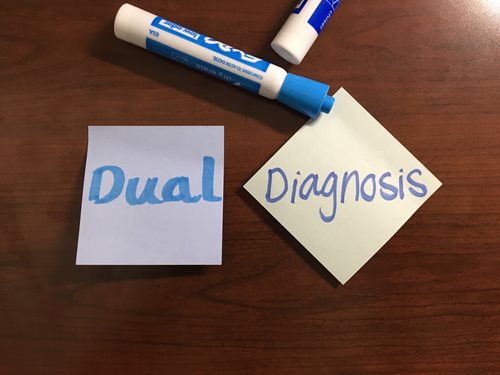October 04, 2017
By Luna Greenstein

As intuitive as the term “dual diagnosis” may seem, it actually doesn’t mean having two mental health conditions. Dual diagnosis (also referred to as a co-occurring disorder) is a term used when someone experiences a mental illness and a substance use disorder simultaneously. Therefore, “dual diagnosis” itself is not a diagnosis, but rather a specific combination of diagnoses.
But this seems like a rarity, right? What are the odds a person would experience both a substance use disorder and a mental illness?
Well, of the 21 million people in the U.S. with a substance use disorder, 8 million also live with a mental illness. In other words, it’s not an exception—it’s much more common than you may think.
While mental health conditions may not directly cause substance use disorders (and vice versa), it is a possibility. Those with mental illness are more susceptible to addiction—substance abuse is twice as prevalent among adults with mental illness—because of the desire to self-medicate symptoms. Some people with mental illness may not even know that their substance use constitutes as a disorder.
However, alcohol and drugs can worsen the symptoms of mental illness. And prolonged use of substances increases the underlying risk for mental illness. Individuals with mental illness consume roughly 38% of all alcohol, 44% of all cocaine and over half of all opioid prescriptions in the U.S. And the more severe the mental illness, the greater the likelihood a person will also use substances.
While it can be difficult to know if one condition causes the other, or even which “came first,” there is often a clear connection between the two.
Addiction and mental illness on their own are difficult to overcome. But when they’re in concert, they’re even more challenging. Mental health professionals may not know how to help you or may not think you can be helped. But you can be. You just need to find the right treatment. Here are a few examples:
While choosing your treatment plan, it’s important to keep in mind that the best treatment would integrate care for both diagnoses. Each condition should be considered primary and receive intervention at the same time. The days of “I can treat your bipolar disorder once you stop drinking” are over.
If you are already in treatment for a mental health condition and think you might have a substance problem, talk to your therapist. Let your therapist know you want to be treated for both conditions simultaneously. While there is no standard dual diagnosis intervention, mental health professionals can use best practices to individualize your treatment. And it’s important to work with a therapist who is willing to do that.
It’s also helpful to find others who understand what you’re going through and connect with them. You can do this by participating in a support program such as Alcoholics or Narcotics Anonymous, Double Trouble in Recovery, or Smart Recovery. If you live with dual diagnosis, it’s nice to know that you are not alone.
Because dual diagnosis is not a special case for select people, it’s a common issue that many people face. And while it is an incredibly challenging issue, you can get better with proper treatment and support.
Laura Greenstein is communications coordinator at NAMI.
We’re always accepting submissions to the NAMI Blog! We feature the latest research, stories of recovery, ways to end stigma and strategies for living well with mental illness. Most importantly: We feature your voices.
LEARN MORENAMI HelpLine is available M-F, 10 a.m. – 10 p.m. ET. Call 800-950-6264,
text “helpline” to 62640, or chat online. In a crisis, call or text 988 (24/7).